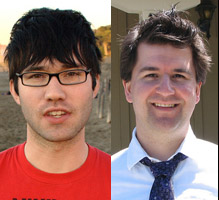Residents of Davis, Calif., have pulled off a feat that new media enthusiasts would love to replicate across the country. Since 2004, a local site has emerged as the go-to place for news and information about the community.
 The Knight Foundation has awarded the founders of Davis Wiki $350,000 to further develop the software that powers the site. Wiki software allows users to work on a site collaboratively, most famously on Wikipedia.
The Knight Foundation has awarded the founders of Davis Wiki $350,000 to further develop the software that powers the site. Wiki software allows users to work on a site collaboratively, most famously on Wikipedia.
“It’s an effort to create a new form of local media around mass collaboration,” Philip Neustrom, one of the Knight grant winners and Davis Wiki cofounder, told me. “When we think about local blogs and how successful they’ve become and how common they are, and when we think about local media and what the future form of that might be, it might make a sense to picture a way where everyone in the community can contribute to one cohesive unified thing.”
 The goal of the site is to provide context and serve as a research and reference tool, rather than tie itself to a news model built around individual stories. From the homepage, if a reader clicks on “schools,” the next page is a complete list of all the education opportunities in the Davis area, from adult non-degree programs, to the local elementary schools.
The goal of the site is to provide context and serve as a research and reference tool, rather than tie itself to a news model built around individual stories. From the homepage, if a reader clicks on “schools,” the next page is a complete list of all the education opportunities in the Davis area, from adult non-degree programs, to the local elementary schools.
Neustrom has been contacted by people in communities around the country who’d like to replicate the idea — but he said the highest hurdle is teaching people how to use the underlying wiki software. He hopes the Knight grant will allow him (with the site’s cofounder Mike Ivanov) to develop something much simpler to use. “Basically, we’re going to take this idea, this prototype idea, and expand upon it and define this type of media,” Neustrom said. “The grant specifically is for the development for software designed from the ground up for local communities doing software around local community needs.”
The first step is to simplify the user interface. They’d like to see it become collaborative software as easy to use as Google Docs. Davis, being a college town, has an unusually high number of young, tech-savvy users who don’t mind learning somewhat tricky wiki formatting code. In other places, Neustrom expects users would need something easier. “The most important thing, which seems very generic but that’s not there right now, is the pure ease-of-use element.” They also want to create a better way of tagging semantic content so that users can find material more efficiently — to answer questions like “How many buildings in downtown were built before 1970? And what are their phone numbers?”
Like several other Knight winners this year, the project wants to come up with interesting ways of incorporating map technology. Neustrom envisions a user being able to take a picture of a tree in Central Park, for example, and sketch out where it is and contribute information about it. And he hopes to come up with a way to better present information in a timeline. Right now, many users click to see what has been updated on Davis Wiki most recently, but a recent change doesn’t necessarily mean a recent event.
I asked Neustrom where he plans to spread next. (Cambridge?) That’s still in the works; for now, they’re taking suggestions. The new wikis will go into at least three new cities or communities in the next 18 to 24 months, though they’d like to set up in 10. He plans to start out in cities with motivated users already in place, ready to get the site going. When we last wrote about Davis Wiki, we noted that one of Davis’ big takeaways was that content breeds more content — making it important to get the site off the ground before more casual users join in.
The Knight grant does not cover outreach work, though, so just a few days after the team found out they won, they’re already on to their next fundraiser. They’ve launched a Kickstarter drive (check that flash video!) to help raise funds to hire someone to handle the outreach, an important role in getting communities actually using the new software. At the moment, the project has eight small-scale backers to join its one big one. As Ivanov says in the video:
But if there’s one thing we learned with Davis Wiki, it’s that the technical aspects are not the biggest challenge. So much of making the Davis Wiki successful was basic community organizing, outreach, coordinating, and education.